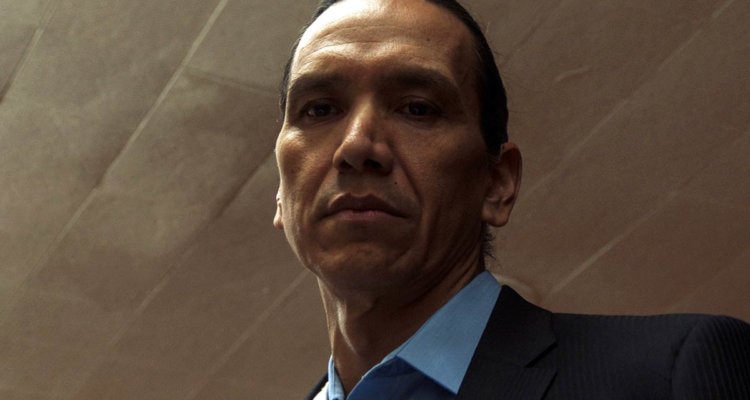Abuse leaves scars unseen but permanent in director Lyle Mitchell Corbine Jr.’s debut “Wild Indian,” a character study wrapped in larger observations on the generational effects of violence and religious guilt. In it, two men marked by a single crime lead distinctively dysfunctional lives. One hides under cover of success and good reputation while the other succumbs to delinquency. The ability to feel remorse separates them.
READ MORE: 25 Most Anticipated 2021 Sundance Film Festival Premieres
Calling back to an immemorial time, the drama opens with a Native American man hiding in a cave, presumably adverting danger. Though the scene could seem detached from what’s to come, the filmmaker makes a case for its significance used as a bookending device. Fast-forwarding to a Wisconsin reservation in the 1980s, a bruised up teen, Makwa (Phoenix Wilson), lies about the physical harm his parents inflict on him to the Catholic priest at his school. Visibly withdrawn, the boy only confides in his cousin Ted-O (Julian Gopal) until a bone-chilling incident parts their ways.
READ MORE: The 100 Most Anticipated Films Of 2021
Present-day Makwa (Michael Greyeyes), now a seemingly callous psychopath, carries around a sick amulet (a fateful bullet symbolizing the power of taking a life). Sleek offices and an even trendier home visually inform us that he’s no longer a fearful kid in a rural community ridden with social issues resulting from institutional neglect and centuries-old disenfranchisement. A loving wife and young child wait at home. But he can’t love them.
Through upward mobility, Makwa has reinvented himself as an intimidating alpha type always in control. Greyeyes’ searing and calculated performance maintains our interest and even as Corbine Jr. expresses Makwa’s taste for sadism in vapid scenes. There’s an unnerving stoicism to the part, that of a wolf in sheep’s clothing perpetually machinating his next move. His imposing presence stands even taller when in the room with Jesse Eisenberg playing a jittery co-worker.
The deck of destiny didn’t stack in adult Ted-O’s (Chaske Spencer) favor, though. Now sporting a tattooed face, he’s just left his latest stint in prison for drug-related incidents. Still, he’s different from Makwa. Ted-O was raised in affection, and while that didn’t prevent him from falling into a life of crime, he’s capable of sincere empathy. As we see him interact with his nephew, “Wild Indian” begins to mirror stories of fractured fatherhood from opposite sides of the respectability line like those that drive Derek Cianfrance’s “The Place Beyond the Pines.”
Mostly compelling but unfocused, “Wild Indian” dips its narrative feet in a slew of themes, all worthwhile, and doesn’t commit to any of them as its guiding star in the murky sky of its ambition. As the filmmaker tries to bind all of the moving parts, the whole turns scattered-brained and structurally disjointed. Tonally, however, the ride is steady into the darkest crevices of the mind, not for sensationalism but to really interrogate the cycles still unbroken specific to Native American communities.
Thankfully, Corbine Jr., a promising artist for sure, at least refrains from making a simplistic about inescapable karma. Instead, what the characters can’t run from, especially Makwa, is their invisible demons of their past, not only that involving their direct family line, but something much more collective. “We are the descendants of cowards,” yells an agitated Makwa, a belief eventually confronted, and even refuted, in a cathartic resolution with no easy platitudes about forgiveness.
Adverting the moralizing route, Corbine Jr. makes “Wild Indian” a potent ordeal despite its wrinkles because it sticks with its protagonist, that’s an anti-hero, in part the product of his environment, but nevertheless, someone who’s committed irredeemable acts. Judging him in terms of virtue or malevolence is not what the story is after, but rather letting Makwa drown in an ocean of pent up regret and hurt. Such psychological intricacy tied to sociopolitical relevance would be laudable even if the piece were far less achieved. Here, it knocks you out. [B]
Follow along with all of our coverage of this year’s Sundance Film Festival here.

